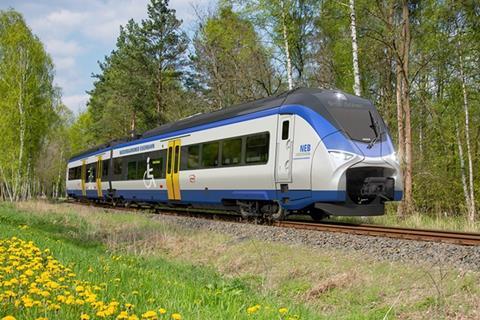
GERMANY: Financing has been put in place for the fleet of battery electric multiple-units ordered to replace diesel multiple-units on regional services in Brandenburg from December 2024.
The 31 Siemens Mobility Mireo Plus B BEMUs ordered in 2021 are being bought by leasing company Alpha Trains through a special purpose vehicle, which will lease them to operator Niederbarnimer Eisenbahn.
The BEMUs will use the 15 kV 16·7 Hz overhead electrification where available, with their lithium-ion batteries providing a range of more than 90 km on non-electrified lines; additional charging points will be provided where required.
Power will be purchased entirely from renewable sources, and the trains will operate on a carbon-neutral basis, which is expected to save more than 4 million litres of diesel per year.
The European Investment Bank is providing a loan of up to €95m for the development and purchase of the trains, and the European Commission is supporting the project with funds from the Connecting Europe Facility and the New Entrants’ Reserve programme. KfW IPEX-Bank is providing a further €70m, while Nord/LB is acting as arranger and agent and will provide up to €34m through the special purpose vehicle, with Alpha Trains also making an equity contribution.
European Commissioner for Transport Adina Vălean said combining EIB loans and CEF funds would ‘maximise the impact of our investments’ in support of environmental objectives.
A 24-year lease for the units has been agreed, with transport authority VBB guaranteeing the leasing costs. The Netz Ostbrandenburg operating contract awarded by VBB to NEB runs for 12 years from December 2024, and the next operator will inherit the BEMU lease agreement in 2036.
EIB said the project was one of the first to fully meet both its climate and sustainability goals.
‘We are pleased to be able to take such a big step on the road to carbon-neutral regional transport in the area surrounding Berlin’, said EIB Vice-President Ambroise Fayolle. ‘Attractive regional trains are essential for the transition to climate-friendly mobility as they encourage commuters to switch from road to rail, thus avoiding the CO2 emissions and congestion caused by the use of private transport.’

















